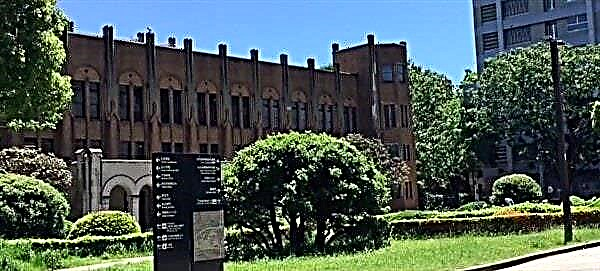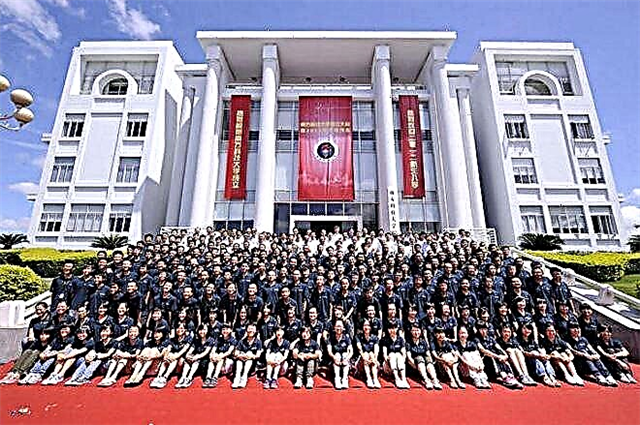Chinese universities are strengthening their positions in world rankings every year. The government of the country allocates huge subsidies for equipping educational institutions of this stage with the latest equipment, encourages research activities and student exchange programs. Tuition fees in Chinese universities may well compete with American and Japanese universities, while maintaining high quality standards and the prestige of the diploma.

Why Chinese universities are popular
Every year, the best universities in China offer a wide range of programs and directions for international students. The demand for Chinese universities is due to several factors:
- Teaching is mainly conducted in Chinese. Each educational institution has courses in which you can improve the level of proficiency in it. At the exit, all graduates speak this language perfectly, which gives them an advantage over other specialists in the labor market.
- There are many science parks in China where science-minded students can conduct all kinds of research.
- Many university campuses are located in beautiful regions of the country that are among the local attractions. For example, the Peking University campus is located in the Imperial Gardens, one of the most beautiful places in China.
- Tuition and accommodation prices are lower than in universities in Europe and the United States.
- Higher education in China is practical. Universities train specialists who are needed by the world and Chinese labor markets, and therefore students here are extremely motivated to achieve significant academic results.
- Excellent students are given the opportunity to apply for a scholarship that covers all tuition fees.
Living in a country with a completely different culture and mentality can also be attributed to the factors influencing the decision when choosing the country where the applicant will go.
A little about the structure of universities in China
Given how many universities there are in China, prospective students are faced with the daunting task of choosing. Today the total number reaches 2.5 thousand educational institutions. All of them are divided into public and private. The latter appeared only a few decades ago.

It is important to bear in mind that not all of the private universities have the right to issue state diplomas. You need to find out about this in advance on the official website of the university.
Since most universities have a pronounced narrow specialization, curricula in China are strikingly different from American and European ones. But the stages of training are the same as in most countries of the world:
- bachelor's degree - 3-4 years;
- Master's degree - 2-3 years;
- doctoral studies - 3-4 years.
All higher education institutions in the country are divided into several types:
- professional higher schools;
- colleges;
- institutions;
- universities.
According to their orientation, they can be conditionally divided into groups:
- specialized;
- general and technical;
- military;
- professional;
- medical.
Universities have budget departments where you can study for free, and there are commercial ones. The competition for both is very high. Therefore, it is a great happiness for a Chinese family if their child managed to enter at all, even if it was a paid faculty.
Admission procedure
 Only a translated certificate and an extract of grades for admission to the ranks of students will not be enough. Most universities teach in Chinese (in particular, in the Mandarin Chinese dialect, which is understood by most of the country).
Only a translated certificate and an extract of grades for admission to the ranks of students will not be enough. Most universities teach in Chinese (in particular, in the Mandarin Chinese dialect, which is understood by most of the country).
To begin with, the applicant will have to pass a language exam (Hanyu Shuiping Kaoshi) and show knowledge of at least the fourth level (you need to score at least 210 points) when it comes to admission to a bachelor's degree. For a master's program, you will need a fifth level (over 210 points), for doctoral studies also a fifth.
The procedure for entering a Chinese university at a faculty with teaching in English involves passing an IELTS or TOEFL test. Some universities for the MBA program require a certificate of passing the GMAT or GRE exam.
Many large universities in the country establish internal exams. They are mandatory for both residents and foreign applicants. In addition, some institutions adhere to the age limit - the applicant must be at least 18 and no more than 25 years old.
The difference in the duration of studies at the intermediate level should also be taken into account. In China, it is 12 years old. If in the applicant's home country this process takes a year less, he will have to compensate for the difference by studying in preparatory courses.
What documents are needed
The package of documents required for admission will be the same for Russians, Ukrainians, Kazakhstanis and residents of other CIS countries:
- Certificate of passing the language exam.
- A certificate or diploma of existing education with an extract of grades, translated into Chinese and certified by a notary.
- Medical certificate confirming the absence of serious illnesses.
- Certificate confirming financial solvency.
- Motivation letter.
- Recommendations from teachers or trainers.
Additionally, the university may ask for diplomas of academic achievement (academic, sports and others), an academic resume. To study, you need to apply for a student visa to China.
What the cost of studying
In Chinese universities, there are budgetary and paid places. The first candidates are mainly talented candidates, children from low-income families, winners of national Olympiads.
How much it costs to study in China depends on the university, city, specialty and the demand for the faculty. The table shows the average figures in Shanghai and Beijing in US dollars for the year:
| Expenditure item | Beijing | Shanghai |
|---|---|---|
| Education at the university | 3 500–5 000 | 3500 |
| Accommodation on campus in a double room | 1 000–2 000 | 1000 |
| Communication and Internet | 200 | 200 |
| Traveling in transport | 500 | 400 |
| Nutrition | 100–200 | 100 |
| Educational literature | 150 | 100 |
| Personal spending | 2000 | 1500 |
| Insurance | 600 | 500 |
| total amount | 9 000–12 000 | 9300 |
On average across the country, tuition prices fluctuate within the following limits (per year):
- preparatory year of study - $ 2,900-3,200;
- bachelor's degree - $ 3,500-5,000;
- Master's degree - $ 3,500-5,000;
- doctoral studies - $ 4,000-5,500;
- MBA - $ 4,000-6,000.
Chinese universities have developed a system of grants and scholarships, which any student can apply for.
Take a sociological survey!
[yop_poll id = ”8 ″]
Leading educational institutions of the country
According to the results of 2021, 4 Chinese universities were included in the top 100 best universities in the world according to the QS World University ranking: Shanghai, Beijing, Tsinghua (Beijing) and Fudan. Local universities have gained the greatest fame in the world in the following areas:
- maths;
- chemistry;
- engineering;
- information Technology.
The ranking of Chinese universities is represented by almost 2,800 universities, which can be found almost anywhere in the country. According to the Russian-Chinese Fund for the Development of Culture and Education, the top five educational institutions include:
- Tsinghua University.
- Peking University.
- Fudan University.
- Zhejiang University.
- Nanjing University.
These universities are famous not only for the quality of teaching, but also for the professional teaching staff. We will dwell on some educational institutions in more detail.
Study at Tsinghua University
 Tsinghua University (Beijing) was founded in 1911. The building of the university is located on the site where the Imperial Park used to be. Currently, Tsinghua University is a leading research institution, from the walls of which specialists in the technical industry and in the natural sciences come out.
Tsinghua University (Beijing) was founded in 1911. The building of the university is located on the site where the Imperial Park used to be. Currently, Tsinghua University is a leading research institution, from the walls of which specialists in the technical industry and in the natural sciences come out.
The university has 56 faculties and 16 institutes.The total number of students is about 30 thousand, of which every 9th is a foreigner.
The pride of the university is the School of Economics and Management.
The university graduates are famous mathematicians, politicians, Nobel laureates in the field of physics.
To study at Peking University
Peking University is the first national university in the country, founded back in 1898. Today it is the center of advanced scientific and social life, the largest research institute in the country. The university is considered a leading international institution due to the fact that a fifth of its students are foreigners.
More than 200 institutes, many laboratories, 2 scientific centers operate on the basis of the university. At the disposal of students is the largest library in Asia (more than 7 million books) and the Sports Palace, which was built for the 2008 Olympics.
The university offers training in 12 faculties:
- humanitarian;
- natural sciences;
- social sciences;
- medical;
- information and engineering and others.
The educational institution maintains contacts with 200 universities in 50 states of the planet.
What is Fudan University famous for
Fudan University was founded in Shanghai in 1905. The strong areas of this university are:
- humanitarian sciences;
- art;
- technology and engineering;
- medicine and life sciences;
- social sciences and management;
- natural Sciences;
- chemistry;
- maths;
- computer science.
The number of students reaches 27,000, the teaching staff is about 3,000 people, among whom there are a lot of foreign teachers.
The university consists of 69 faculties and 17 institutes. Students of medical departments undergo practical training at 10 hospitals that work at the university.
There is also a large Science Park, which includes more than 480 enterprises working in the field of high technologies.
Jiao Tong University in Shanghai
This educational institution is one of the oldest universities in the country, founded at the end of the 19th century. About 100 scientists and Nobel laureates teach here.
In Shanghai, the institution has 6 buildings, the buildings of which are a historical landmark. Leading directions:
- engineering;
- medicine;
- Social sciencies;
- Technical science.
The university includes over 100 research institutes and research centers. The university is very popular with foreigners due to its numerous student exchange programs and its convenient location.
Jiao Tong University conducts extensive research work, the results of which are designed to meet the needs of society. Today, the scientific activity of the university is concentrated in the field of molecular biology, nanotechnology, mechanical engineering and biomedicine.
Study at China University of Science and Technology
 The University of Science and Technology of China was founded on the initiative of the Chinese Academy of Sciences in 1958 in Beijing. In 1970, the institution moved to Hefei City. This is the strongest technical educational institution in the country, whose diploma is respected all over the world.
The University of Science and Technology of China was founded on the initiative of the Chinese Academy of Sciences in 1958 in Beijing. In 1970, the institution moved to Hefei City. This is the strongest technical educational institution in the country, whose diploma is respected all over the world.
It trains specialists in the following areas of knowledge:
- chemistry;
- nuclear technology;
- physics;
- information Technology;
- mechanical engineering.
One of the leading is also the direction "science of life, space and Earth."
In terms of the number of students, the university cannot be called large. It trains no more than 17 thousand people.
Zhejiang University
Zhejiang University, located in Hangzhou, may join the list of "Best Universities in China for Russians". Its foundation falls on 1897.
National laboratories and research institutes operate on the basis of the university. There are many professors and academicians of sciences among the teachers. The number of students reaches 40 thousand people.
Leading directions:
- pedagogical;
- foreign languages and humanities;
- technology and engineering;
- natural Sciences;
- medicine and life sciences;
- management and business;
- computer science;
- chemistry;
- physics.
The university has one of the largest libraries in the country - over 7 million volumes. Great strides have been made here in the area of innovative discoveries in the technical industry.
The university has 6 polyclinics that provide assistance to the poor in the region.
Nanjing University
Nanjing University was founded in 1902 in the city of the same name. The structure of the university includes:
- three campuses;
- 100 research centers;
- 127 institutes.
About 40 thousand students study here. More than 200 educational institutions of the world are partners of the university. The teaching staff numbers almost 2,000, of whom 27 are employees of the Chinese Academy of Sciences. Leading faculties:
- humanities and social sciences;
- chemistry;
- physics;
- computer science;
- information Technology;
- maths;
- Social sciencies.
The number of foreign citizens among students is 6%.
Beijing Normal University
Beijing Normal University is the country's leading institution for the training of teachers and teachers. At one time, the university became the first to receive the right to admit students from abroad. It offers a large number of long-term programs for the study of the Chinese language.
A key feature of the university is the absence of a requirement for compulsory passing of a language exam. Instead, the student is given a probationary period of 1 year. After this period, the student can be tested and confirm the level of knowledge.
Training is conducted in 47 bachelor's programs and 107 master's programs.
Wuhan University
 Wuhan University was founded on the initiative of the governor of Hubei and Hunan counties. Initially, the university was called "the school of the strong" or "the school of relying exclusively on oneself." The number of students here in some years reached 50 thousand people.
Wuhan University was founded on the initiative of the governor of Hubei and Hunan counties. Initially, the university was called "the school of the strong" or "the school of relying exclusively on oneself." The number of students here in some years reached 50 thousand people.
The university campus is located on the shores of Donghu Lake. From the Luojia Hill, where the buildings are located, a picturesque view of the surrounding area opens.
An unusual location at an altitude of more than 100 meters above sea level, a climate that differs from other parts of the country and an abundance of forests makes studying at the university a unique, full of special mood.
Leading directions:
- engineering and technology;
- humanities and arts;
- natural Sciences;
- chemistry;
- maths;
- computer science.
Harbin Polytechnic University
The list of Chinese universities that may be of interest to Russian students can be supplemented by the Harbin Polytechnic University. It was founded on the initiative of Chinese and Russian scientists in a city with Russian roots - Harbin.
Initially, it was a school for training specialists in the field of railway transport. Today the university trains specialists in the following fields:
- technology and engineering;
- maths;
- computer science;
- natural Sciences.
The number of students reaches 25,000, another 12,000 are receiving postgraduate education. The Polytechnic University trains the best specialists in the field of space technology, civil engineering, management and economics. People also come here to get education in legal areas, in the field of arts.
What is the group "K-9"
China's economic growth is largely due to the reform of the education system and funding from the state and commercial organizations. One of the projects aimed at strengthening the scientific potential of the PRC was the K-9 group, which included 9 national research universities of the country.
Very often this association is compared to the Ivy League in the USA (an association of 8 elite universities).
All research projects carried out on the basis of these institutions receive investment from the state; that's about 10% of China's annual budget.
The group includes:
- Peking University,
- Fudan University,
- Tsinghua University,
- Shanghai Jiao Tong University,
- Nanjing University,
- China University of Science and Technology,
- Zhejiang University,
- Harbin University of Technology,
- Xi'an Jiaotong University.
Other popular universities
In addition to those listed above, there are many other educational institutions that can interest future applicants:
- Tsinghua University (Beijing) is one of the leading multidisciplinary universities in China. Suitable for both humanities and those who gravitate towards technical specialties.
- Beihang University (Beijing) is one of the strongest technical universities in China, specializing in astronautics and aviation.
- Chongqing University (Chongqing) - trains specialists in the field of arts and humanities, social and natural sciences, engineering, environment, information technology.
- Donghua University (Shanghai) is an international educational institution and venue for the Shanghai Fashion Festival.
- Beihua University - the leading areas are medicine and international economics. Included in the ranking of "The Best Medical Universities in China".
- Shanghai University of Politics and Law is a specialized university in the humanities with a focus on law, politics and business. Due to its location in a picturesque area, it is known in China as a university garden.
- China University of Petroleum (Qingdao Dongying) trains specialists in the oil and engineering industries. The university is managed by the Ministry of Education and 4 leading oil companies of the country.
- The University of the Arts in China is located in Hangzhou (180 km from Shanghai). Here you can get a diploma in architecture, sculpture, painting, design history.
Educational institutions in the regions
 At the regional level, the Republic of China can also offer a wide variety of educational institutions:
At the regional level, the Republic of China can also offer a wide variety of educational institutions:
- Education in the universities of Hong Kong is conducted according to the English or American model.
- The University of Hong Kong offers programs in English, here you can get a diploma in the field of applied and human sciences, medicine. The university is famous for several discoveries in the field of medicine.
- The Chinese University of Hong Kong can offer programs in two languages - Chinese and English.
- The Hong Kong University of Science and Technology is renowned for its innovative teaching and engineering design. In total, there are 9 state-owned universities in Hong Kong, several private ones, as well as branches of foreign universities. For example, the American College of Art and Design in Savannah.
- In Taiwan, as well as on the mainland, tuition is paid in both public and private universities. The scholarship is only available for the program in Chinese. But some universities provide their own grants for English-language courses. The prestigious universities in this region are:
- National Taiwan University - almost 31 thousand students study here, 8% of whom are foreigners. Key areas: engineering, humanities, mathematics, chemistry, physics.
- Taiwan Normal University is the leading pedagogical university in the region.
- National Taiwan University of Science and Technology - trains specialists in the field of engineering and technology, humanities and social sciences.
- Xi'an is one of the leading educational centers in the country. In total, there are 49 educational institutions of higher education, in which more than 600 thousand students study. Most of the aerospace industry is concentrated in the region, and therefore there are many technical universities. This should be taken into account when choosing which city in China is better to study. The leading universities include:
- Xi'an Petrochemical University is the first university in the country that began to train specialists in this industry.
- Northwestern University of Politics, Law and Business is the leading educational institution in the region in this area.
- The University of Electronic Sciences and Technology is famous for its achievements in the field of electronics and information technology.
- Among the universities of Tianjin, it is necessary to highlight:
- Nankai University - you can get education here in a variety of fields, from fine arts to microbiology.
- Tiens University is one of the youngest and most successful universities in the country. Here they master the professions in the field of marketing, informatics, web design, engineering.
- Macau University is very popular in Macau. The university includes 7 faculties: humanities and arts, business administration, pedagogy, medicine, natural and social sciences.
What are the prospects for graduates of Chinese universities
Diplomas from higher educational institutions in China are recognized in many countries, including the United States and European countries. Employers value the quality of Chinese education: the world knows firsthand about the desire of the PRC government to bring the educational system to the highest level, which is supported by substantial funding and encouragement of research activities.
A diploma from a Chinese university is a guarantee of diligence, professionalism, excellent knowledge, and commitment to its owner. Graduates of Chinese universities quickly find work and are in demand in all professional fields.
Interesting about education in China
A few facts that might be of interest to prospective students:
- Until the middle of the last century, over 80% of Chinese residents did not speak literacy. Today, all the children of the country attend school, many of them aim to enter a university.
- Chinese is considered one of the most ancient, complex and beautiful languages in the world. The number of hieroglyphs in it reaches 80 thousand, in ordinary life the Chinese use only three, and for an elementary understanding of the interlocutor, only two thousand are enough.
- China has always contested the palm in the number of inventions. It was here that the compass, gunpowder, paper, and typography were invented. The desire to be the first, including in the field of development and education, continues today.
- Chinese universities adhere to strict rules during the educational process. Students are not given the freedom to choose subjects and timetables. All of them are required to follow a clear training regimen. This approach, according to young people, fosters perseverance and disciplines.
- The PRC is the world's leader in the number of universities and the number of graduates in the field of information technology.
Outcomes
Even before making a decision, it is necessary to evaluate all the pros and cons of studying in the PRC:
| Advantages | disadvantages |
|---|---|
| the possibility of in-depth study of the Chinese language; | the politicization of universities and the authoritarianism of their leadership; |
| low cost of training when compared with Europe and America; | sometimes discipline and control are overly strict; |
| demand for graduates of Chinese universities in the world market; | high competition for admission; |
| due to a different approach to teaching, high discipline of students and a high level of professional training; | difficulties in obtaining scholarships for programs taught in Chinese; |
| accommodation on university campuses; | the need for an additional year of study due to the difference in academic programs in the CIS and China. |
| the opportunity to stay to work in one of the most promising countries in the world. |











